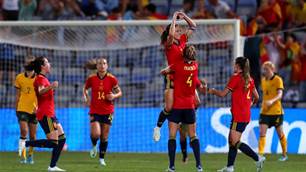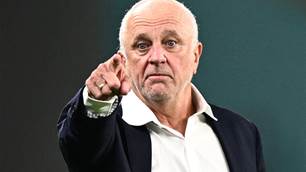PREVIEW: The Socceroos are just hours away from their World Cup opener against the Germans so get stuck into our comprehensive fact fest.
Date: Sunday June 13
Kick-off: 8:30pm local (4:30am AEST)
Venue: Moses Mabhida Stadium, Durban
Analysis:
Australia's World Cup campaign launches with an imposing clash against perennial World Cup powerhouse Germany in Durban.
All the expectation of the past four years, generated by Australia's second round appearance on German soil in 2006, has rolled on to South Africa, where a difficult group awaits.
Germany are undoubtedly the toughest of the tough group, having won three World Cups and having finished in the semi-finals on home soil four years ago and lost in the final to Brazil in 2002. They have a rich World Cup heritage which contrasts greatly with Australia's two previous appearances for just one win in six matches.
The imposing task has not been made any simpler by injury concerns over key players in the lead-up to this match. Harry Kewell, Brett Emerton and even Tim Cahill have had their battles in the weeks leading up to the World Cup. Kewell and Cahill have both said they are fit, while Emerton's strong work at training sessions during the week are ample evidence that his calf niggle is a thing of the past.
Pim Verbeek will likely take a very familiar looking line-up into this match, gauging from what he has done in the lead-ins against Denmark and the USA. With Emerton and Cahill fit, the only point of contention is whether Verbeek opts to go with Kewell from the outset, despite the striker's lack of game time and prolonged recovery from groin surgery.
His other choice is the start Josh Kennedy again. Kennedy spent ten years in Germany as a player and his height is an issue for any defence.
But Germany boast two quality centre halves in Per Mertesacker and Arne Friedrich and Kennedy will have a hard time getting the space he needs to be at his best in the air. He will rely heavily on the contributions of Cahill, Mark Bresciano and Emerton, while the delivery from Luke Wilkshire from set pieces will be crucial to Australia's hopes of breaking down the German defence.
Germany also have a world class left back in Phillip Lahm where most of their attacks will begin, while the Australian midfield will have its hands full, trying to quell Bastian Schweinsteiger, who will be looking to fill the shoes in the injured Michael Ballack in the middle of the park.
Vince Grella, coming off an injury interrupted season with Blackburn in England, will be given the role of stopping Schweinsteiger's run through the middle of the park. However, Germany possesses plenty of pace and skill on the flanks through Lukas Podolski and Mesut Ozil.
Up front will be Miroslav Klose, a scorer of a massive 48 goals at international level and ten goals in World Cup finals, just five short of Ronaldo's record.
Australia will have the same central defensive pairing as it did at the last World Cup, with Lucas Neill and Craig Moore, boasting over 100 caps of experience between them, flanked by Wilkshire and Scott Chipperfield.
Germany arguably has only two weaknesses, the fact they have their youngest squad at a World Cup for 76 years and they have struggled to find a permanent goalkeeper. Manuel Neuer looks the choice for this match.
On face value, Germany would start favourites in this match, but there is so much up in the air for both sides. The perception is that Australia will be happy to settle for a draw, however perceptions and reality can be very far apart at World Cups.
Australian squad:
1. Mark Schwarzer, 2.Lucas Neill, 3.Craig Moore, 4.Tim Cahill, 5.Jason Culina, 6. Michael Beauchamp, 7.Brett Emerton, 8.Luke Wilkshire, 9.Josh Kennedy, 10.Harry Kewell, 11.Scott Chipperfield, 12.Adam Federici, 13.Vince Grella, 14.Brett Holman, 15.Mile Jedinak, 16.Carl Valeri, 18.Eugene Galekovic, 19.Richard Garcia, 20.Mark Milligan, 21.David Carney, 23.Mark Bresciano, 25.Dario Vidosic, 31.Nikita Rukavytsya,
Germany squad
Goalkeepers: Manuel Neuer (Schalke), Tim Wiese (Werder Bremen), Hans-Jorg Butt (Bayern Munich)
Defenders: Dennis Aogo (Hamburg), Holger Badstuber (Bayern Munich), Jerome Boateng (Hamburg), Arne Friedrich (Hertha Berlin), Marcell Jansen (Hamburg), Philipp Lahm (Bayern Munich), Per Mertesacker (Werder Bremen), Serdar Tasci (Stuttgart)
Midfielders: Sami Khedira (Stuttgart), Toni Kroos (Bayer Leverkusen), Marko Marin (Werder Bremen), Mesut Ozil (Werder Bremen), Bastian Schweinsteiger (Bayern Munich), Piotr Trochowski (Hamburg)
Strikers: Cacau (Stuttgart), Mario Gomez (Bayern Munich), Stefan Kiessling (Bayer Leverkusen), Miroslav Klose (Bayern Munich), Thomas Muller (Bayern Munich), Lukas Podolski (Cologne).
Head-to-head
Played 2: Wins: Australia 0, Germany 2
Previous meetings
Germany 4, Australia 3, Frankfurt, Confederations Cup, June 2005
Australia 0, West Germany 3, Hamburg, World Cup, June 1974
Past five matches:
Australia:
Australia 1, United States 3, Johannesburg, June 5, 2010
Australia 1, Denmark 0, Johannesburg, June 1, 2010
Australia 2, New Zealand 1, Melbourne, May 24, 2010
Australia 1, Indonesia 0, Brisbane, March 3, 2010
Kuwait 2, Australia 2, Kuwait City, January 6, 2010
Germany
Germany 3, Bosnia-Herzegovina 1, Frankfurt, June 3, 2010
Hungary 0, Germany 3, Budapest, May 29, 2010
Germany 3, Malta 0, Aachen, May 13, 2010
Germany 0, Argentina 1, Munich, March 3, 2010
Germany 2, Cote D'Ivoire 2, Gelsenkirchen, November 11, 2009.
Related Articles

Matildas 'have parked' 7-0 thrashing: 'We're one of the best pressing teams in the world'

Socceroos coach says Argentina can only 'play two ways'














